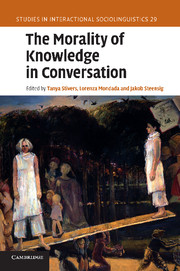Book contents
- Frontmatter
- Contents
- Contributors
- Preface
- Acknowledgements
- List of transcription and glossing symbols
- Part I Introduction
- Part II Affiliational consequences of managing epistemic asymmetries
- Part III Epistemic resources for managing affi liation and alignment
- 7 Territories of knowledge, territories of experience: empathic moments in interaction
- 8 The terms of not knowing
- 9 Proposing shared knowledge as a means of pursuing agreement
- 10 Ways of agreeing with negative stance taking
- 11 Epistemics and embodiment in the interactions of very young children
- Part IV Toward a framework
- References
- Index
9 - Proposing shared knowledge as a means of pursuing agreement
Published online by Cambridge University Press: 05 November 2011
- Frontmatter
- Contents
- Contributors
- Preface
- Acknowledgements
- List of transcription and glossing symbols
- Part I Introduction
- Part II Affiliational consequences of managing epistemic asymmetries
- Part III Epistemic resources for managing affi liation and alignment
- 7 Territories of knowledge, territories of experience: empathic moments in interaction
- 8 The terms of not knowing
- 9 Proposing shared knowledge as a means of pursuing agreement
- 10 Ways of agreeing with negative stance taking
- 11 Epistemics and embodiment in the interactions of very young children
- Part IV Toward a framework
- References
- Index
Summary
Introduction
Participants in social interaction rely on different ways of dealing with questions of rights and access to knowledge. For instance, they sometimes deal with questions of rights to know by addressing a person's access to the information as either exclusive or non-exclusive. And they sometimes address questions of rights to know by framing the information as something the co-participants ought to know or ought not to know, thereby making questions of epistemic stance accountable in talk. By dealing with these different aspects of epistemics, co-participants recurrently negotiate rights and access to knowledge as a basis for a common frame of understanding. This means that questions of epistemic stance are inherently related to questions of alignment and affiliation (Heritage and Raymond 2005).
Two of the major studies concerned with epistemics (Heritage and Raymond 2005; Raymond and Heritage 2006) have dealt with the role of epistemics in competing or disaligning actions that are embedded within an otherwise affiliating context. In one study (Heritage and Raymond 2005), the ongoing negotiation of the participants, about who has the primary right to know what, is dealt with as indexing epistemic authority and subordination in the talk. In another study (Raymond and Heritage 2006), epistemic rights are shown to function as a resource for participants to construct and establish identities in interaction.
In contrast to these studies, in the present chapter the focus is placed on the role of epistemics for aligning or affiliating actions in an otherwise disaffiliating context.
- Type
- Chapter
- Information
- The Morality of Knowledge in Conversation , pp. 207 - 234Publisher: Cambridge University PressPrint publication year: 2011
- 22
- Cited by



